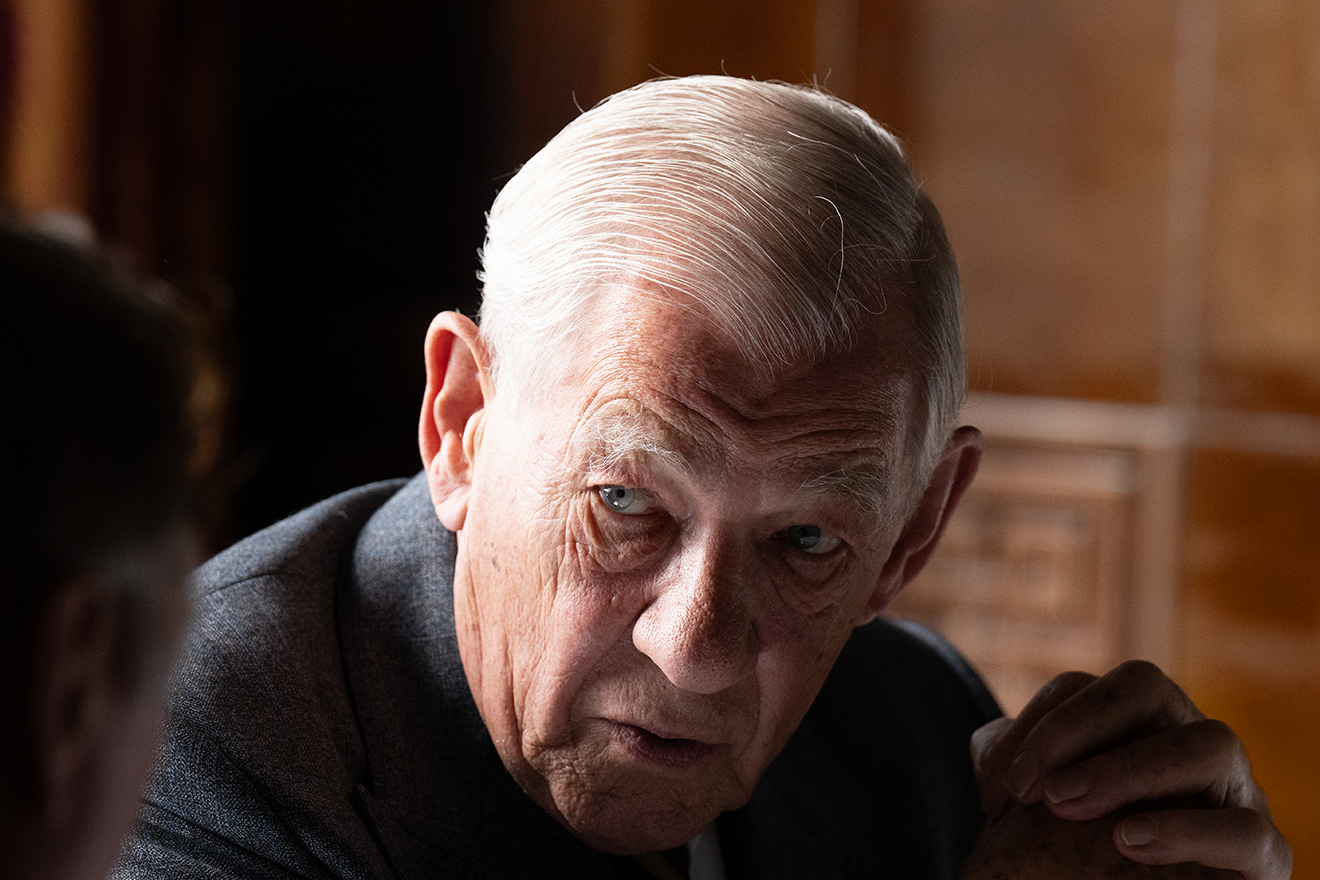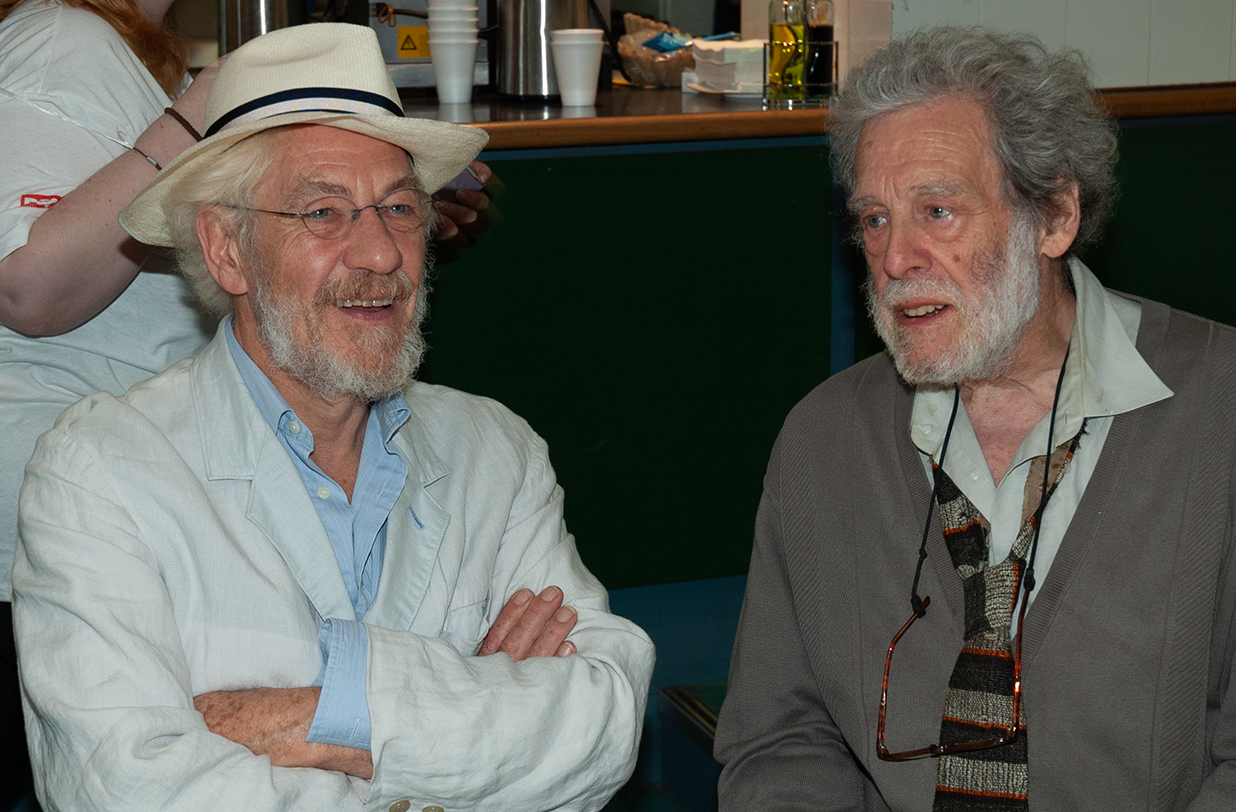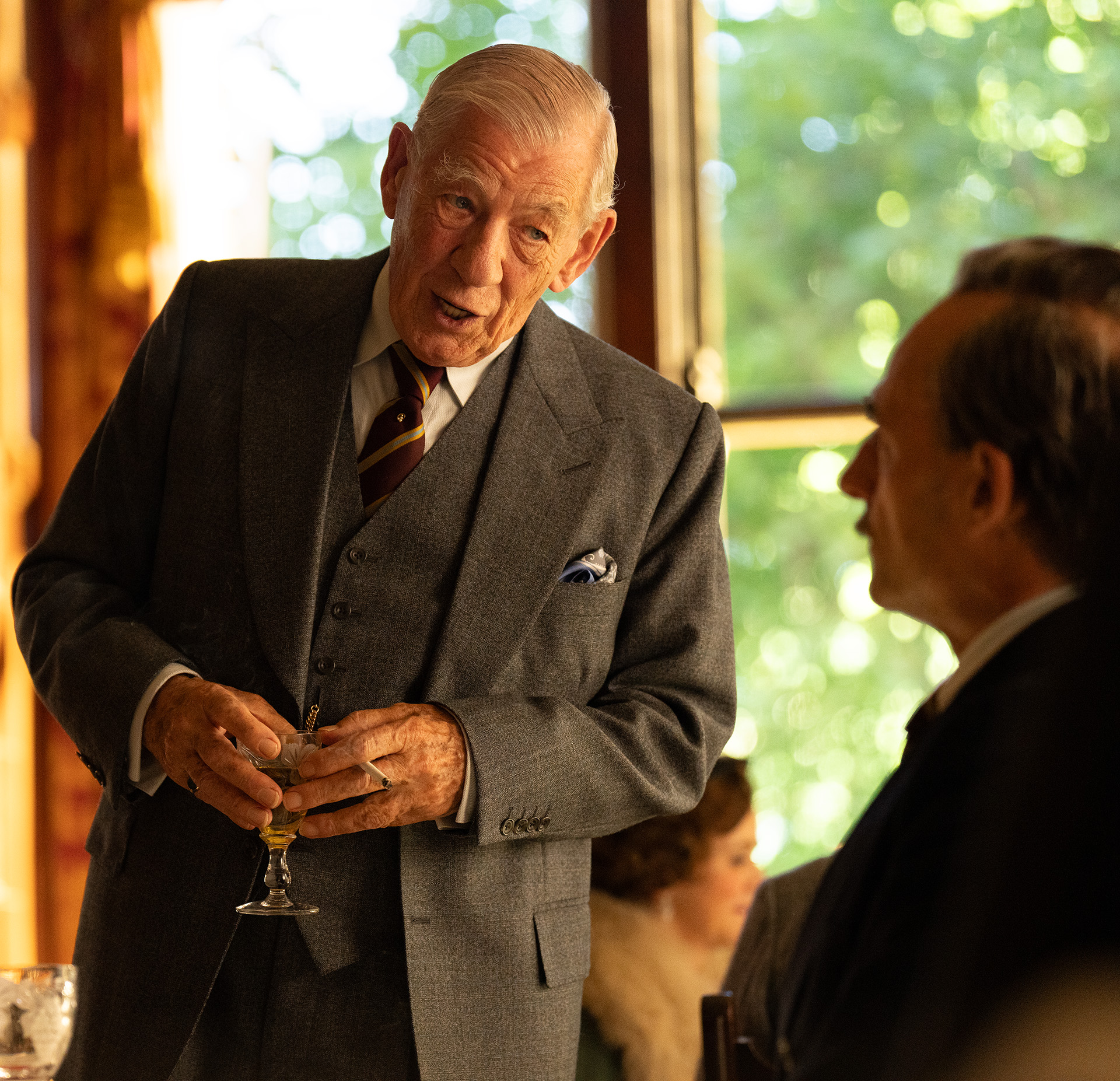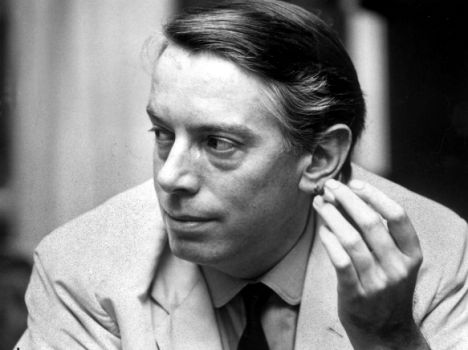
THE CRITIC is now playing in US, UK and Ireland Cinemas. Starring Ian McKellen, Gemma Arterton, Mark Strong, Ben Barnes, Alfred Enoch, Romola Garai and Lesley Manville.
“James Erskine,” the critic in Patrick Marber’s latest screenplay, is a complicated bounder. He parades his prejudices and attacks his victims with the same ferocity that his kind (queers not critics) have long endured from homophobes, like the National Front bullies in the film. He is fearless, ambitious, vain-glorious. With his colleagues at work, he is comfortably witty, generous, the life and soul. He despises his boss: he loves his secretary. Lots of detail for an actor to play and explore, so that, despite its sensational plot, The Critic is not crude melodrama. When Marber sent me his script he was clearly proud of his creation.
In our director Anand Tucker’s rehearsals, I realised that Jimmy shares some attributes of real-life theatre critics I have known or known of.
The first theatre critic I read was John Wardle, who wrote in the 1950s for the daily “Bolton Evening News,” reviewing local amateur companies, as well the prestigious professionals touring the classics and West End hits at the Opera House and Palace Theatre in nearby Manchester. Wardle had started out as an actor and joined Miss Horniman’s pioneering repertory company at Gaiety Theatre in Manchester.
I knew him as Jack Wardle, backstage at Bolton Little Theatre, the amateur company he had co-founded: a quiet, avuncular, scholarly type, stooped with bushy white hair. I was in a few BLT youth productions. But I saw the grown-ups in classics old and new. When Geoffrey Banks, who taught me French at school, played Hamlet, Jack Wardle was his spectral father on the battlements of Elsinore Castle . Over 70 years on, I recall the dreadful thrill I felt, when the Ghost stumbled over his torrent of words and then dried up.
His real son, named after the great Victorian actor, was Irving. When I arrived at Bolton School for Boys, teachers still talked about young Irving Wardle’s accomplished Hamlet in the annual School Play ten years previously. A decade later he was in London, critiquing other actors’ work, eventually as senior drama critic for “The Times.” Like father, like son.

For my first appearance in the West End, I was given The Clarence Derwent Award for the “best supporting performance”. Funded by Equity, the actors’ union, it’s a unique acting prize, in that it comes with a cheque – in 1964 £50, a tenner more than my weekly salary in A Scent of Flowers. One of the three judges was Irving Wardle. So, much as I relished the honour and the cash, I couldn’t help wondering if they’d come my way because of the generous nepotism of a fellow Boltonian.
If you wonder if critics are ever venal in their praise, wait till you see what Jimmy Erskine gets up to in The Critic! But, like Jack Wardle he began as a professional actor, so perhaps he can be excused for knowing what he is writing about. And (my favourite speech in the film) he recalls when he nearly met Oscar Wilde! “I wasn’t pretty enough to engage his attention…”

Ian McKellen and John Barton in Stratford-upon-Avon, 2007. Photo by Keith Stern
At Cambridge in 1959, I was cast as the ancient Justice Shallow in Henry 4th part 2 for the undergraduate Marlowe Society. Derek Jacobi was a glamorous Prince Hal and our director was John Barton, a don at King’s College, researching the staging of plays in Shakespeare’s day. The following year, John joined his mate Peter Hall in Stratford-upon-Avon, to co-found the Royal Shakespeare Company.
Barton was demanding and persistent when teaching me how Shakespeare’s words can set the scene, as well as carry the story.
E.g. Sir John Falstaff arrives in Master Shallow’s Gloucestershire estate on a recruiting campaign. His host enters with: Nay you shall see my orchard. “Ian, stress that first word, persuade your reluctant visitor with it: be a bossy host. Naaaaaaay , you shall … Enter again.” And again and again until John was satisfied and moved on to my orchard.
“Let the audience sense your pride in your trees and their fruit. Orchard is a juicy word. Make them visualise the foliage and apples, from the way you say it. “Again: and again.”
The result was that I did little more than obey the director by copying his every detailed inflection: a display of mimicry not my own invention. But what audience could tell? What critic? Certainly not Alan Dent, reporting on our production for the late “News Chronicle” before it was devoured by the rapacious Daily Mail.
In accord with the Marlowe Society’s custom, we student thespians were all anonymous, unnamed in the programme and unknown to most of the audience. Critics from the London papers came up to review the show, including Alan Dent, who wrote in the “Chronicle,” “Here’s a brilliant Justice — but who is he?” and “Infinitely the best performance, though, is that of Justice Shallow who is genuinely ancient, wheezy, full of sudden changes and chortles and sadnesses. I read this undeserved praise over and over, before reporting to the Arts Theatre for the evening’s show. A mate was waiting for me at the stage door in Edward’s Passage. He opined that I’d be “getting an agent next”. What? Why? Because, he said, “professional actors all have agents”. I could take you to the very flagstone where I stood that happy evening of 12 March 1969, when I decided irrevocably to try and become a full-time actor.

Twelve years on I received this letter:
“9th August, 1970; Dear Mr. McKellen, Some press-agency sent me recently a cutting from FLAIR in which you were very capably interviewed by Sheridan Morley. You mentioned a review of mine in the old News Chronicle which — though I could not give your name — gave you great encouragement. Will you most kindly tell me the name of the play at Cambridge in which I discussed your talent (it must be ten years ago since the News Chronicle collapsed to my great hurt in 1960)? I want to look up my own notice — which is about all I have to do these days! Your most discerning and appreciative — Alan Dent”
I have had other correspondence with critics, who are generally civil when their inaccuracies are corrected. But I’ve avoided arguing with them when they seem to have missed or not approved of the point of a production or performance. Actors are used to criticism, every day from directors, more valuable than a critic’s judgement based on one viewing at a first night.
“Jock” Dent had been secretary to James Agate, the gay doyen of drama critics, who pronounced each week in The Sunday Times, with authoritative paragraphs of praise or displeasure. Patrick Marber endows his Jimmy Erskine with James Agate’s verbal agility as well as his sexuality. I chanced on this Erskine review in an edition of The Daily Chronicle, which was never noted by the camera, only by grateful actors who are not used to such meticulously prepared props lying about the set.
The News Chronicle was not the only national paper to review our undergraduate efforts. And I wasn’t the only student actor to be enthused over. After three years and 27 performances, I had a valuable sheath of notices to accompany my applications to prospective employers.
Everyone is talking about THE CRITIC:
Trump: “She’s one of these complainers, like a critic. I remember growing up, I would see plays on Broadway and go to other things and you’d have critics, they criticized. They were critical, critical. But they never did it themselves.” https://twitter.com/Acyn/status/1823818115031163063
Photos by Nick Wall except where otherwise noted.


When I started acting in 1961, Irving Wardle was second string at the Observer, where its star drama critic was Kenneth Tynan. How I should have relished his approval but I’m not sure he ever saw me act. Certainly he didn’t mention it, when we chatted for 15 minutes at a party. The National Theatre was about to open on the South Bank, where Peter Hall was replacing Laurence Olivier, its first Artistic Director. He would dispense with Tynan’s work as dramaturge to Olivier when the NT was founded at the Old Vic. But the Tynan legacy was secure. He told me it had been his idea to include a studio theatre within the new complex and the basic plans had to be shifted about to accommodate the Cottesloe Theatre. Perhaps next time it changes its name, it should be called The Tynan Studio”. “Perfect theatres produce the possibility of perfect productions.” he claimed. Mmmmm, I thought and moaned about the neglect of the regions in favour of our London-centric theatre industry. Tynan made a prescient point. “There aren’t enough talented people” (by which he meant directors and advisers like himself) “to run all the regional theatres which employ acting companies”.
I was at the time playing the young Corporal Napoleon in Bernard Shaw’s one-act fizz of a farce “Man of Destiny” which he’d written for Henry Irving and Ellen Terry. My Corporal sparred with the breeches role (woman disguised as a man) played by Sian Phillips. “Ah Shaw”, Tynan mused, “only has one plot for most of his his plays. No-one is whom they seem to be. A character comes on and is soon revealed to be the opposite of their appearance. Doolitle, the dustbin-man is actually a philosopher: and his flower-selling daughter Eliza Doolittle transmutes into royalty. A peasant boy in Arc is actually Saint Joan of Arc.”